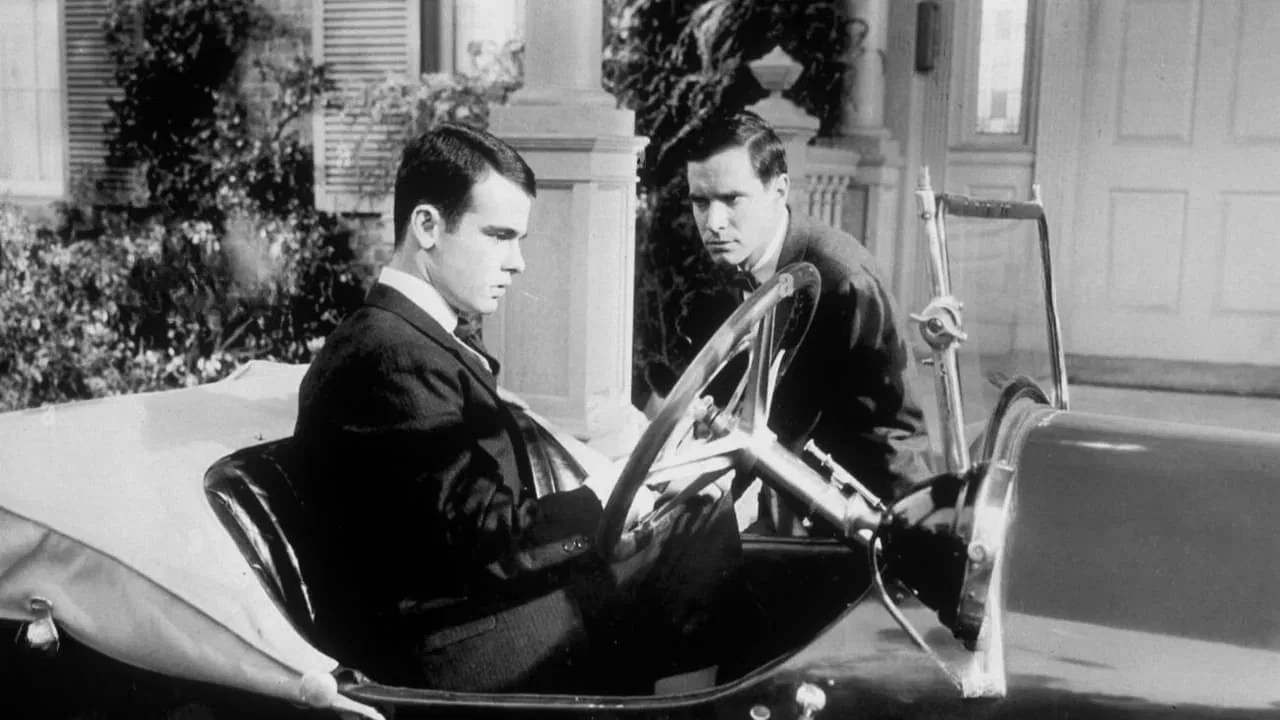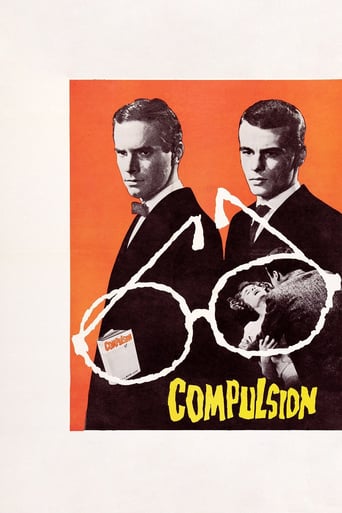

We are back to the Leopold-Loeb murder as two wealthy students think they are more cleverer than their fellow man and think that rules or morals do not apply to them.Artie Straus (Bradford Dillman) is the dominant one who prompts, provokes and persuades Judd Steiner (Dean Stockwell) along with himself to kidnap and kill. However Steiner inadvertently left something behind that leads to suspicion towards the two.When it comes to the trial, noted heavyweight attorney, Jonathan Wilk (Orson Welles) is hired who needs to save these two young men from the death penalty.The film is starkly shot in black and white and is set in 1924. With the talk of Nietzsche's philosophy the period setting means you get away from the recent events of the second world war. The two men's sexuality is heavily implied even though we also see Steiner having a troubled relationship with Ruth Evans (Diane Varsi.)Orson Welles comes into his own at the end with an impassioned plea for these confused men's lives from the gallows. Maybe the speech is a little too preachy.The film does not delve on the actual murder or the 14 year old victim. It concentrates on the two misguided young men, whose supposed intelligence soon unravels even though Straus tried to mislead the police.
... View MoreCompulsion is directed by Richard Fleischer and adapted to screenplay by Richard Murphy from the novel written by Meyer Levin. It stars Dean Stockwell, Bradford Dillman, Orson Welles and Diane Varsi. Music is by Lionel Newman and cinematography by William C. Mellor.Based upon the real life Leopold and Loeb murder trial of the 1920s, Compulsion finds Artie Strauss (Dillman) and Judd Steiner (Stockwell) as two well to do young men attempting to commit the perfect crime - murder! But it wasn't so perfect after all and they soon find themselves on trial for their own lives. Enter famed attorney Jonathan Wilk (Welles), who fights to keep them from the death penalty.Healthily rated in some quarters, it's a film that actually does divide opinions, which when all is considered is unsurprising given the capital punishment core of the story. The story builds superbly, brilliantly photographed and paced by cinematographer and director, and performed with imposing skills by Dillman and Stockwell. Then the crux of the film arrives in the form of Welles, who late in the play has the unenviable job of turning the piece into a soapbox anti capital punishment advertisement. It's also a performance from Welles that has drawn major pros and cons in critical circles. Whatever your thoughts on capital punishment, Welles makes a telling acting mark. The sound mix could have been fine tuned, as Welles is prone to mumble during his speeches, but it remains gripping on court room drama terms, even if there's a little deflation - a feeling of anti-climax - after the build up had been so good. Not really capturing the notoriety of the real case, it's nonetheless a compelling piece and well worth seeking out. 7/10
... View MoreCompulsion (1959) *** (out of 4) Law students Judd Steiner (Dean Stockwell) and Arthur Straus (Bradford Dillman) kill a young boy just to see what murder is like. The two think they're smart enough to get away with it but the local D.A. (E.G. Marshall) finally busts them for it and plans on seeking the death penalty but a successful and popular lawyer (Orson Welles) decides to take the case to try and save their lives. COMPULSION is loosely based on the Leopold-Loeb murder case, which was also previous told by Alfred Hitchcock in his underrated ROPE. I personally think the Hitchcock film is much better but this one here is still very much worth watching thanks in large part to the terrific performances. I think the film's story is mildly entertaining but it never fully grabbed me. I think part of the reason it didn't is that the opening hour just isn't strong enough to fully make us hate these two characters. I know that might sound weird to say but I think the film needed us to have some sort of stronger feelings about the two boys. I also think it would have been better had the film explained a bit better why these two decided to murder like they did. With that said, the film really picks up speed during the final forty-minutes and especially once Welles enters the picture. His entrance is certainly very memorable but the actor also turns in one of his greatest performances because of how cool and laid back he is. The final monologue has become somewhat legendary and for good reason. I've seen enough courtroom dramas to know how most people would have placed this but the way Welles does it is just a complete joy to watch. Both Stockwell and Dillman are also extremely good in their roles. There's not a single second that goes by that you don't believe them in the parts and best of all is how they manage to get that coldness of their characters across. Marshall also deserves a lot of credit for his strong performance. The film's B&W cinematography is also extremely good and director Richard Fleischer handles the material with no problem.
... View MoreNo need to recap the plot.From what I've read, it looks like the screenplay sticks pretty closely to the real facts of the investigation. There's the eyeglasses tip-off, the phony alibi with the two girls, the car they couldn't have used, et al. At first, I thought these were just Perry Mason- type script gimmicks, but they're not. For a couple of super intellects, Steiner and Straus (Loeb & Leopold) committed one heckuva clumsy murder.Perhaps the movie's most interesting feature is how the 1959 production flirts with some of the more forbidden aspects of the real life Loeb and Leopold. In '59 the notorious Hollywood Production Code was losing its grip on the studios. Perhaps the most vivid example is that year's Anatomy of a Murder. There such otherwise taboo words as 'panties' and 'sperm' made their first screen appearance, shocking some audiences, but adding a new adult level to the screen. Then too, shouldn't forget Hitchcock's Psycho, also produced in '59, and the first appearance of, oh my gosh, a real live toilet.Whatever the envelope-pushing in some parts of Hollywood, there's little of it here, and that hesitation works to the movie's detriment. Just what is the nature of the unusual bond between these two privileged, self-appointed supermen. At times, the script hints at something more than just shared Nietschean hubris, but dares not get more explicit about Leopold and Loeb's real life homosexual attachment. Note how the script plays around with a black book full of girls' names in Straus's (Dillman) case and whether Steiner (Stockwell) knows any girls at all. Now, as others have pointed out, this appears a crime that neither would have committed without the other. In short, their attachment and at times co-dependency is rooted in more than just shared intellect. It's also a kind of 'insane love' or what the French call 'amour fou'. This time rooted in a homosexual context. Had the screenplay dealt honestly with this key aspect of the case, their motivations would have been much clearer than what we're presented with.That aspect also sheds light on one of the film's most dramatic scenes. It's the one where a confused Straus begins an assault on the sympathetic Ruth (Varsi), but can't go through with the act. Now, one would suppose that it's not moral compunction that holds him back. After all, he and Steiner believe themselves above common morality. However, if we interpret Straus's confusion as sexual in nature, then his inability to complete the act becomes clearer. As things stand, his withdrawal back into himself comes across as muddled innuendo that we're left to figure out. To me, turning this key element into scattered hints instead of dealing candidly with their homosexuality, not only reflects taboos of the time but muddies the film as a whole.The movie itself is certainly well acted. For a production that depends more on talk than action, this is a key factor. The one concession in the casting department, it appears, is Milner and Varsi as the attractive youngsters, a move I suspect that was made for commercial reasons since there's no counterpart in the real case itself, that is, from what I've read. I'm glad Welles low-keys it as the defense attorney, who in real life was the notable Clarence Darrow. Had Welles blustered, his lengthy courtroom appeal would have been hard to endure. According to one account I read, Loeb and Leopold were very unimpressed with Darrow on first meeting, what with his disheveled appearance, he looked anything but the ace attorney he was. Later, of course, they came to appreciate his skills. As Darrow, Welles, of course, repeats this sloppy appearance.My one complaint is with a typical Hollywood pander. Now, for better or worse, Darrow was an outspoken atheist. But commercial Hollywood couldn't leave him at that, turning him in the movie's final moments into a fence-sitting agnostic instead. I guess they figured that would go down better with the audience. Also, it was not actually Darrow who said that dropping the incriminating eyeglasses could have been the work of God. It was the prosecuting attorney. But then, old Hollywood was never big on historical fact.My sense is that despite the powerhouse cast, the movie has drifted into semi-obscurity mainly as a reflection of its time. Were it made again today, now that the lid is off, who knows what the results might be.
... View More